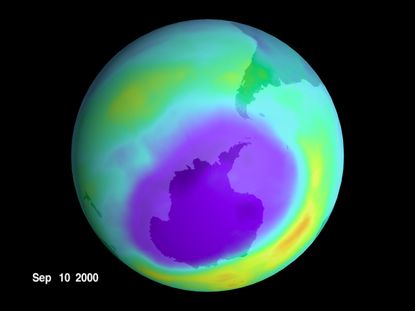Scientist who discovered ozone layer hole: 'We are still inflicting major changes on the atmosphere'


Thirty years after three British scientists discovered a hole in the ozone layer over Antarctica, one of them says humans are still "inflicting major changes on the atmosphere."
"Then, it was chlorofluorocarbons; today it is greenhouse gases," Jon Shanklin of the British Antarctic Survey told The Guardian. "The ozone hole story tells us that it is very easy to cause major changes to the atmosphere — it only took about 10 years to develop — but it is very difficult to restore equilibrium. Unfortunately, we don't seem to have learned that lesson."
In 1985, Shanklin, along with colleagues Brian Gardiner and the late Joe Farman, discovered manmade chemicals were depleting the ozone in the upper atmosphere, allowing cancer-causing radiation to reach the earth. Their work led to the Montreal Protocol, an international treaty that banned CFCs and has been called "the single most successful international agreement to date."
Subscribe to The Week
Escape your echo chamber. Get the facts behind the news, plus analysis from multiple perspectives.

Sign up for The Week's Free Newsletters
From our morning news briefing to a weekly Good News Newsletter, get the best of The Week delivered directly to your inbox.
From our morning news briefing to a weekly Good News Newsletter, get the best of The Week delivered directly to your inbox.
But Shanklin now notes that "the CFCs we put up there will take a long time to dissipate," and that the ozone layer is far from fully recovered.
Read the rest of the interview over at The Guardian.
Sign up for Today's Best Articles in your inbox
A free daily email with the biggest news stories of the day – and the best features from TheWeek.com
Create an account with the same email registered to your subscription to unlock access.
Sarah Eberspacher is an associate editor at TheWeek.com. She has previously worked as a sports reporter at The Livingston County Daily Press & Argus and The Arizona Republic. She graduated from Northwestern University's Medill School of Journalism.
-
 Fall into the groove at these delightful record stores
Fall into the groove at these delightful record storesThe Week Recommends Each one strikes its own chord
By Catherine Garcia, The Week US Published
-
 How likely are you to get audited by the IRS?
How likely are you to get audited by the IRS?The Explainer The odds are greater for some than others
By Anya Jaremko-Greenwold, The Week US Published
-
 Crossword: April 22, 2024
Crossword: April 22, 2024The Week's daily crossword
By The Week Staff Published
-
 Caitlin Clark the No. 1 pick in bullish WNBA Draft
Caitlin Clark the No. 1 pick in bullish WNBA DraftSpeed Read As expected, she went to the Indiana Fever
By Peter Weber, The Week US Published
-
 South Carolina ends perfect season with NCAA title
South Carolina ends perfect season with NCAA titleSpeed Read The women's basketball team won a victory over superstar Caitlin Clark's Iowa Hawkeyes
By Rafi Schwartz, The Week US Published
-
 Iowa's Caitlin Clark breaks NCAA scoring record
Iowa's Caitlin Clark breaks NCAA scoring recordspeed read College basketball star Caitlin Clark set the new record in Iowa's defeat of Ohio State
By Peter Weber, The Week US Published
-
 Eight-year-old Brit Bodhana Sivanandan makes chess history
Eight-year-old Brit Bodhana Sivanandan makes chess historySpeed Read Sivanandan has been described as a 'phenomenon' by chess masters
By Sorcha Bradley, The Week UK Published
-
 Watch Simone Biles win her record 8th US gymnastics championship
Watch Simone Biles win her record 8th US gymnastics championshipSpeed Read
By Peter Weber Published
-
 Spain beats England 1-0 to win its first Women's World Cup
Spain beats England 1-0 to win its first Women's World CupSpeed Read
By Justin Klawans Published
-
 US knocked out of Women's World Cup in stunning exit
US knocked out of Women's World Cup in stunning exitSpeed Read
By Justin Klawans Published
-
 Katie Ledecky surpasses Michael Phelps for most world championship titles
Katie Ledecky surpasses Michael Phelps for most world championship titlesSpeed Read
By Justin Klawans Published